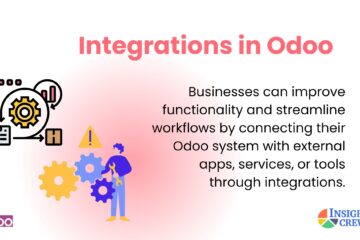Mixin classes effectively add reusable functionality to models in Odoo 18 without requiring direct changes. By offering reusable methods, a mixin is a specialised class that lets programmers improve or modify fields, processes, and behaviours in pre-existing models without affecting the underlying structure. This method makes reusing components across different models easier, promotes cleaner code, and enhances maintainability. We will examine the idea of mixing classes in this blog article and show you how to extend models in Odoo 18 efficiently. A new class can access the model’s and the mixin’s methods and properties by inheriting from it. This l for developers who want to enhance already-existing features.
A Mixin Class: What Is It?
An abstract class called a mixin class offers methods and properties that other classes can use by inheritance. It is meant to be used as a basic platform for expanding the functionality of other classes rather than being instantiated directly. To provide flexibility and reusability, a mixin class usually contains methods or characteristics that you wish to add to different models. To increase their capabilities without requiring direct changes, a mixin class can, for instance, declare particular fields that can be inherited and utilised in models that extend it.
Step 1: Make a Mixin class
First, let’s create a mixin class with an activity logging function added. Here’s an illustration:
from odoo import models, api
import logging
_logger = logging.getLogger(__name__)
class ActivityLoggerMixin(models.AbstractModel):
_name = ‘activity.logger.mixin’
_description = ‘Activity Logger Mixin’
@api.model
def log_activity(self, message):
_logger.info(message)
Step 2: Use the Mixin to Expand Current Models
We can expand on current models now that we have our mixin class. For example, let’s provide the res. partner model logging capabilities:
from odoo import models
class ResPartner(models.Model):
_name = ‘res.partner’
_inherit = [‘res.partner’, ‘activity.logger.mixin’]
def create(self, vals):
record = super().create(vals)
self.log_activity(f’Partner created: {record.name}’)
return record
The Benefits of Mixin Classes
- Reusability: Mixins don’t duplicate code when used in different models.
- Separation of Concerns: By keeping your code structured, this method facilitates maintenance.
- Extensibility: Adding or changing your models’ functionality is easy.
Crucial Points to Remember
* Use models to define mixin classes as abstract models.AbstractModel.
* Mixins should only be used as foundation classes; do not instantiate them.
* Make sure your mixins’ methods don’t clash with those in the models they extend.
In Odoo 18, you may effectively improve your models while keeping your code neat and simple by using mixin classes. Mixins facilitate the development of your application by encouraging code reuse and functionality separation, which keeps it adaptable and maintainable. In your Odoo development toolbox, mixin classes are an invaluable tool for adding features like logging and validation.


